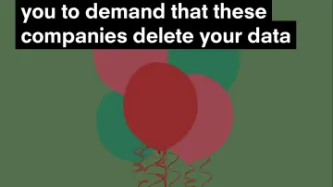Search
Content type: Examples
The Dutch data protection authority has fined Uber €10 million for failing to inform drivers how long it retains their data or how it secures it when sending it to countries outside the EEA, and hindering drivers' access to their data by making requests unnecessarily complicated. The fine follows a complaint filed by 170 French drivers with a human rights organization, which complained to the French data protection authority, which forwarded It to the Netherlands, where Uber has its European…
Content type: Examples
Uber Eats delivery drivers in northern French cities went on strike on October 22, 2023 to protest falling wages since the platform changed its policies to effectively reduce its per-kilometre compensation. Drivers complain the platform is less transparent since the changes.https://actu.fr/economie/livreurs-uber-eats-en-greve-dans-le-nord-ils-denoncent-une-baisse-de-leur-remuneration_60249320.html Publication: Lille Actu
Content type: Examples
French data protection agency CNIL has fined Amazon's French warehouse management unit €32 million, or about 3% of its turnover, for its "excessively intrusive" surveillance of the performance of its thousands of staff. The system relied on data collected from the scanners warehouse staff use to process packages. CNIL said the surveillance placed workers under continuous pressure and forced them to justify absences, as the scanners timed inacctivity to the second and also penalised workers for…
Content type: Examples
An administrative court in Montreil, France issued a preliminary ruling ordering the Paris-based Distance Learning Institute to suspend its use of the e-proctoring platform TestWe, which uses facial recognition and algorithmic analysis to monitor students.Video and sound analysis track students' eye movements and their surroundings, a practice the court ruled disproportionate. The case was brought by a group of students represented by La Quadrature du Net and casts doubt on the legality of…
Content type: Examples
Four French trade unions representing drivers signed an agreement with ride-hailing platforms to provide drivers with a minimum income and provide greater transparency regarding suspending and terminating drivers. Platforms must now give drivers a chance to respond before deactivating their accounts and must provide compensation based on previous income if an account's suspension proves unjustified. https://www.bfmtv.com/economie/entreprises/vtc-nouvel-accord-entre-plateformes-et-syndicats…
Content type: Examples
The French minister of national education and youth has advised schools not to use the free versions of Microsoft Office 365 and Google Workspace because French public procurement contracts require payment. Paid versions may be allowed if they do not violate data protection rules, including a 2020 French ruling that cloud services that store data in the US are not compliant with GDPR.
https://www.theregister.com/2022/11/22/france_no_windows_google/
Writer: Thomas Claburn
Publication: The…
Content type: Examples
In a preliminary ruling, the administrative court of Montreuil suspended the use of algorithmic e-proctoring software called TestWe after students at the Institute of Distant Study of the University of Paris 8 brought a legal case, assisted by La Quadrature du Net. The plaintiffs argued that the software failed to comply with GDPR because the software failed to comply with data minimisation standards and its visual and audio surveillance was disproportionate to the intended purpose. A final…
Content type: Examples
By the end of its first three weeks of availability, the French contact tracing app, “StopCovid”, had seen 1.9 million downloads. Of these, only 68 people had entered a positive COVID-19 test result, and only 14 were notified that they might have been exposed, according to the French junior minister for digital affairs, Cédric O. He attributed the app’s uninstallation by 460,000 people to a “decline in concern” about the epidemic in France.
https://www.politico.eu/article/french-contact-…
Content type: Examples
A new requirement to wear wear masks in public in order to curb the spread of the coronavirus poses a problem in France and Belgium, where laws prohibit wearing face coverings, with health as the only allowed exception.
In France, where the law was passed in 2010, between 2011 and 2017 1,830 Muslim women were fined for wearing veils and 145 were warned. The law does not state how to distinguish when face coverings are worn for health reasons rather than religious belief.
This leaves…
Content type: Examples
France has been testing AI tools with security cameras supplied by the French technology company Datakalab in the Paris Metro system and buses in Cannes to detect the percentage of passengers who are wearing face masks. The system does not store or disseminate images and is intended to help authorities anticipate future oubreaks.
https://www.theguardian.com/world/2020/jun/18/coronavirus-mass-surveillance-could-be-here-to-stay-tracking
Writer: Oliver Holmes, Justin McCurry, and Michael Safi…
Content type: Examples
The French data protection authority, CNIL, has examined the French contact tracing app and ruled that it is not fully compliant with the provisions of GDPR and the French data protection law. CNIL’s primary complaint was that the app transferred the news that a user had been infected to all their contacts, not just those who had been in recent proximity, and the privacy policy was insufficiently specific about the categories of data that were being processed and its recipients. Finally, the…
Content type: Examples
By the end of March 2021 Eurostar will roll out a facial verification system in which passengers will send a scan of their passport and a selfie so that when boarding they can prove their identity by walking through a camera-lined “biometric” corridor instead of presenting their documents. The Department for Transport is funding the system as part of a £9.4 million competition to revolutionise rail travel and is being developed by the British company iProov in partnership with Eurostar and the…
Content type: Examples
The lives of residents in French and Scottish nursing homes have been put in danger by the homes’ use of Dahua and Hikvision fever scanning cameras. The homes are violating ISO standards for such cameras: they have been incorrectly installed in front of large windowed doors, the staff are not given sufficient time to acclimate after coming in from outdoors, and the cameras deliver incorrect readings when the forehead is obscured by hair or a hat.
https://ipvm.com/reports/hikua-nursing
Writer:…
Content type: News & Analysis
In September 2019, PI published the report Your Mental Health for Sale. Our investigation looked into popular mental health websites and their data sharing practices.
Our findings suggest that, at the time of the research, most websites we looked at were using third party tracking for advertising purposes, sometimes relying on programmatic advertising technologies such as Real Time Bidding (RTB), sharing personal data with potentially thousands of actors. Some websites were also found sharing…
Content type: Examples
As part of their preparations to ease the lockdown, French authorities have added AI tools into the CCTV cameras in the Paris Metro to detect the number of passengers who are wearing face masks. The system is also being used in outdoor markets and buses in Cannes. Although it is mandatory to wear a mask on public transport in France, the software won't be used to identify, rebuke, or fine people, and the system has not proved as contentious as contact tracing. The data protection regulator CNIL…
Content type: Examples
France, like the UK, opted to develop its own contact tracing app. "StopCovid", using a centralised design developed by the Pan-European Privacy-Preserving Proxity Tracing (PEPP-PT) group, which created a framework called ROBust and the privacy-presERving proximity Tracing protocol (ROBERT). French ministers have defended the decision to choose ROBERT rather than the decentralised options, DP3T or Apple's and Google's jointly developed API, saying that the app is not intended to monitor…
Content type: Examples
The lower house of the French parliament paved the way for the launch of the government's independently-developed contact tracing app. The minister in charge, technology minister Cedric O, praised the app, developed by companies such as Orange and Dassault Systemes, as a French project "with the excellence but also the panache and some would say the stubbornness which characterises our country". O added that although 22 other countries have opted to use the Google/Apple platform, it was not a…
Content type: Examples
The French government asked Apple to change the way its phones handle Bluetooth in order to accommodate the design of its contact tracing app. Downloading and installing the app will be voluntary, but the app will use a centralised design in which the data will be fed into a government server for processing.
Source: https://www.zdnet.com/article/france-asks-apple-to-relax-iphone-security-for-coronavirus-tracking-app-development/
Writer: Charlie Osborne
Publication: ZDNet
Content type: Examples
The French telecom operator Orange is repurposing its 2013 Flux Vision, which allowed cities and tourist destinations to see their visitors' travel flows, to answer European Commissioner Thierry Breton's call for the EU's mobile operators to provide their location data to fight the pandemic through population monitoring. The French data protection regulator, CNIL, is suggesting that the data is anonymised and therefore legal to use. However, in order to provide the service Orange must first…
Content type: Key Resources
In the run up to the French presidential election of 2017, political parties increasingly used data-driven targeting techniques and companies to manage their campaigns. Here are some examples.
Content type: Examples
According to research conducted by Ronan Chardonneau, a French associate professor of digital marketing at Angers University, none of the websites of the eleven candidates' in the 2017 French presidential elections, that he looked into respected CNIL's directives regarding information that should be available on the website and consent requirements for data collection. According to this research, nine of the candidates used Google Analytics, without activating the option to anonymize data…
Content type: Examples
A company called Liegey Muller Pons (LMP) offers data analysis tools to help candidates and political parties improve their political campaign strategy. The three founders of the company were member's of former President François Hollande's 2012 campaign team. LMP was then hired by current President Emmanuel Macron during his Grande Marche campaign before the elections and during the presidential elections by the Socialist Party candidate Benoît Hamon. LMP offers data analysis that allows…
Content type: Examples
NationBuilder is an American political campaigning software company, which offers a fully integrated suite of tools for the organization of a campaign, and outreach through e-mail, telephone, social media, and traditional door-to-door campaigning. Many candidates in the 2017 French presidential elections were reported as using their services. Among others, the company offers a functionality called 'match'. When users provide their email address on a campaign's website, 'match' allows the…
Content type: Examples
During the primary elections in November 2016, the former French president, Nicolas Sarkozy, reportedly used an app, called Knockin, that made it possible to identify and geolocate supporters for door-to-door campaigning. Based on a report by the French Radio RMC, the app would harvest public data about anyone that liked a page or a post that the candidate put on his campaign page in order to find the supporter's address. Door-to-door volunteers were then able to see on the app the address…
Content type: Examples
In 2014, when the the far-right party of French politician Marine Le Pen needed cash, the loan of €9.4 million came from First Czech-Russian Bank, which was founded in the early 2000s as a joint venture between a Czech state bank and a Russian lender and went on to come under the personal ownership of Russian financier Roman Popov and obtain a European license via a subsidiary in the Czech Republic. Two and a half months after the Le Pen loan was signed, a Mediapart investigative journalist…
Content type: News & Analysis
We found this image here.
In order for GDPR to be effective at protecting people's data, it must be implemented and enforced. Therefore, we are pleased to see that CNIL has taken action and issued Google a fine of €50 million based on complaints by NOYB and La Quadrature Du Net in May 2018. Despite numerous statements by Google that it takes the protection of people's data seriously, the decision demonstrates that they have a long way to go and that regulators will take action to hold…
Content type: News & Analysis
Email addresses
Acxiom: [email protected]
Criteo: [email protected]
Equifax: [email protected]
Experian: [email protected]
Oracle: https://oracle.ethicspointvp.com/custom/oracle/dp/en/form_data.asp
Quantcast: [email protected] cc: [email protected]
Tapad: [email protected]
Letter for Acxiom and Oracle
subject line: Right to Erasure Request
I am concerned your company exploits my data.
In accordance with my right[s] under the General Data…
Content type: Press release
Today, Privacy International has filed complaints against seven data brokers (Acxiom, Oracle), ad-tech companies (Criteo, Quantcast, Tapad), and credit referencing agencies (Equifax, Experian) with data protection authorities in France, Ireland, and the UK. Privacy International urges the data protection authorities to investigate these companies and to protect individuals from the mass exploitation of their data.
Our complaints target companies that, despite exploiting the data of millions of…
Content type: News & Analysis
Written by Privacy International
07:06: Camille’s smart pillow sends a signal to her smartphone that it’s time for her to wake up. She checks the quality of sleep on the app – last night was not great. Because the pillow tracks the motion in her bed, the company knows what else she may (or may not) have been up to. But the company doesn’t just track her when she is in bed. By downloading the app, Camille has also authorised access to her location wherever she goes, her camera, her contact…









